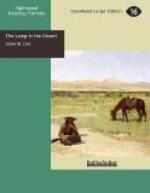A certain exultation sounded in his voice, but the next instant he bent and kissed her.
“Why do you dwell on these things? They only trouble you. But I think you might remember that since they exist, someone has to deal with them.”
“You don’t trust Ahmed Khan?” she said. “You think he is treacherous?”
He hesitated; then: “Ahmed Khan is either a tiger or—merely a jackal,” he said. “I don’t know which at present. I am taking his measure.”
She still held him closely. “Everard,” her voice came low and breathless, “you think he was responsible for Captain Ermsted’s death. May he not have been also for—for—”
He checked her sharply before Ralph Dacre’s name could leave her lips. “No. Put that out of your mind for good! You have no reason to suspect foul play where he was concerned.”
He spoke with such decision that she looked at him in surprise. “I often have suspected it,” she said.
“I know. But you have no reason for doing so. I should try to forget it if I were you. Let the past be past!”
It was evident that he would not discuss the matter, and, wondering somewhat, she let it pass. The bare mention of Dacre seemed to be unendurable to him. But the suspicion which his words had started remained in her mind, for it was beyond her power to dismiss it. The conviction that he had met his death by foul means was steadily gaining ground within her, winding serpent-like ever more closely about her shrinking heart.
Monck went his way, whether deeply disappointed or not she knew not. But she realized that he would not reopen the subject. He had made his explanation, but—and for this she honoured him—he would not seek to convince her against her will. It was even possible that he preferred her to keep her own judgment in the matter.
They dined at the Mansfields’ bungalow that night, a festivity for which she felt small relish, more especially as she knew that Mrs. Ralston would not be present. To be received with icy ceremony by Lady Harriet and sent in to dinner with Major Burton was a state of affairs that must have dashed the highest spirits. She tried to make the best of it, but it was impossible to be entirely unaffected by the depressing chill of the atmosphere. Conversation turned upon Mrs. Ermsted, regarding whom the report had gone forth that she was very seriously ill. Lady Harriet sought to probe Stella upon the subject and was plainly offended when she pleaded ignorance. She also tried to extract Monck’s opinion of poor Captain Ermsted’s murder. Had it been committed by a mere budmash for the sake of robbery, or did he consider that any political significance was attached to it? Monck drily expressed the opinion that something might be said for either theory. But when Lady Harriet threw discretion to the winds and desired to know if it were generally believed in official circles that the Rajah was implicated, he raised his brows in stern surprise and replied that so far as his information went the Rajah was a loyal servant of the Crown.




